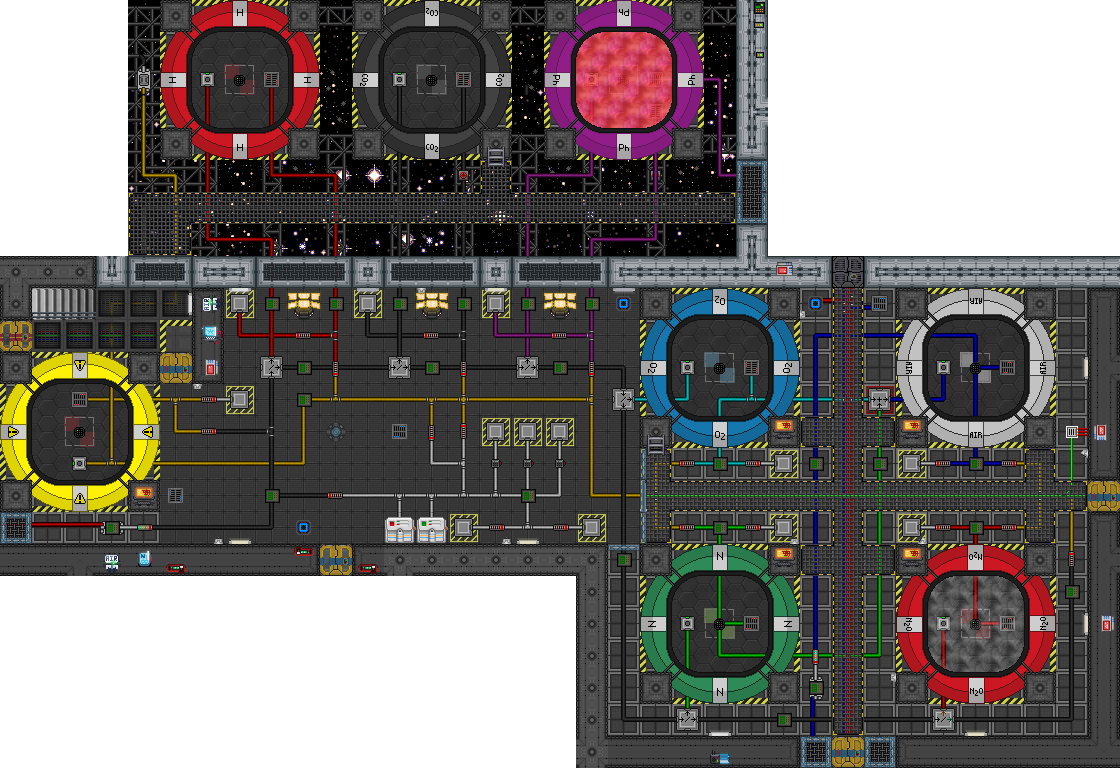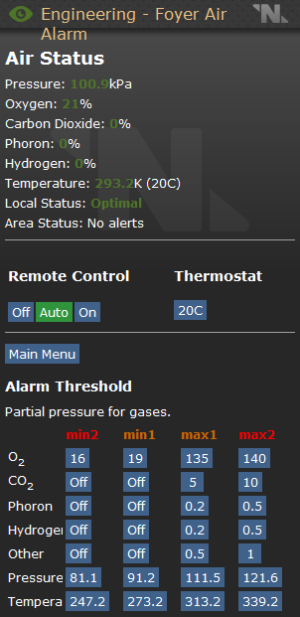Участник:Burrito Justice/Sandbox
Atmospherics: The Department

Welcome to Atmospherics, the place where Dreams Come True™. Or at least the place that can partially sustain the ability to dream... y'know, by allowing you to breathe and stuff. Breathing is important, and the primary function of this maze of pipes and gas is to distribute breathable air throughout the station efficiently, and to restore air to depressurized - but hopefully air-tight - rooms. Its secondary function is to process contaminant gases captured by the scrubber network and sort the gas accordingly into one of many chambers.
If you're new to all of this - or even just someone who's never really given Atmos a fair shake - then this will all look very complex and downright intimidating to look at. This mostly stems from just how much stuff can get on screen at once, but there's a few things put in place to make pipe-readability easier on the user if they just take the time to truly examine what each pipe network is meant to do. Alongside that will be this guide to help you out.
What Do These Colors Mean?
So there's a lot of pipes with a bunch of colors and they all look really important. It's true that all of the colored pipes - which represent different pipe networks - have their place in the department, but not all of them are strictly necessary to produce gas. Here's all of the important colors, though note that the colored pipes beneath the catwalks aren't to be taken into account:
- Air Mix: This is the air mix loop, and these pipes are the most important: they're the ones that contain the air mix, which is combined at a mixer set to specific percentages to ensure that the gas everyone breathes is, in fact, breathable. Tampering with the mixer is ill-advised, as is modifying this network in such a way that it will not be able to reach the distribution network.
- Distribution: Equally important is this blue network, offset pipes to the south alongside the scrubber pipes. This massive network of pipes is what will actually distribute the air that it receives from the air mix loop and send it all towards vents placed all around the station, ensuring every room remains at optimal pressure.
- Filtering: These pipes are part of the filtering network, a pipe line connected to the scrubber network that leads to filtering devices which will filter a select gas out of the line and output it into a large storage chamber full of that same gas. If the gas type does not match then it'll continue down the line until it eventually does reach where it's meant to go. If, somehow, it reaches the end of the line and doesn't match any of the filtering criteria then it will just be output into the mix loop.
- Scrubber: You'll probably notice some pipe adapters and pipes that aren't centered towards the south of Atmos proper. These pipes are part of the scrubber network and, as you can imagine, much of this network is comprised of scrubbers. The end of this line - where all of the scrubber pipe contents are pumped out towards - is the filtering line.
- Mix: This line is a bit odd, but its intended function is to provide a pipe network that you can pump any of the gases in atmos into, allowing you to make custom mixes and letting you warm them up or cool them down. Using this line isn't necessary for Atmos to function, but it's good to use as a test bed of sorts if you'd like to experiment with how devices interact with pipe networks. Note that part of this network is colorless.
- Misc Mix: These pipes aren't actually part of a network, they just pipe oxygen and nitrogen into a mixer which outputs into the air chamber which later outputs into the air mix line.
- Waste: These are the black pipes, as few as they are, towards the southern end of Atmos proper. It's intended function is to eject undesirable gas out into space harmlessly, usually by pumping gas you don't want filtered into it from either the mix line or the filter line by way of pumps, and turning a valve open to space.
Principles and Concepts
Pressure
Delta P
watch out for that pressure differential. also 200 kpa ambient pressure blah blah
Temperature
e x p a n d
Specific Heat
factors into heat capacity
Volume
Mass
moles moles moles
Math
See this section for volume of pipes
Pressure (in kPa) * Volume = Moles * 8.314 (the molar gas constant) * temperature (in Kelvin. Kelvin = Celsius + 273.15)
Gas Gas Gas
 Oxygen (O2): 20 SH, 0.032 MM, oxidizer, necessary for life
Oxygen (O2): 20 SH, 0.032 MM, oxidizer, necessary for life Nitrogen (N2): 20 SH, 0.028 MM, inert, non-toxic
Nitrogen (N2): 20 SH, 0.028 MM, inert, non-toxic Air (Air): 79% N2 21% O2
Air (Air): 79% N2 21% O2 Carbon Dioxide (CO2): 30 SH 0.044 MM, toxic in high concentrations
Carbon Dioxide (CO2): 30 SH 0.044 MM, toxic in high concentrations Nitrous Oxide (N2O): No, it's not N20, it's N2O. Jamming twenty nitrogen molecules together would be stupid. 40 SH 0.044 MM, sleep agent, oxidizer
Nitrous Oxide (N2O): No, it's not N20, it's N2O. Jamming twenty nitrogen molecules together would be stupid. 40 SH 0.044 MM, sleep agent, oxidizer Hydrogen (H2): 100 SH 0.002 MM, fuel, non-toxic
Hydrogen (H2): 100 SH 0.002 MM, fuel, non-toxic Phoron (PH): 200 SH 0.405 MM, fuel, toxic, contaminant
Phoron (PH): 200 SH 0.405 MM, fuel, toxic, contaminant
Relevant Tools
wrenches and analyzers. also the pipe dispenser
 Wrench
Wrench Pipe Wrench
Pipe Wrench Impact Wrench
Impact Wrench Gas Analyzer
Gas Analyzer Pipe Dispenser
Pipe Dispenser RPD
RPD- Файл:Multitool.pngMultitool: for changing what network a meter pays attention to
Pipes and Devices
Basic Pipes
- Straight: 70L
- Corner:
- Manifold: 105L
- Four Way: 140L
- Cap: 35L
- Z-Pipe: 70L, effectively 140L
- Universal Pipe Adapter: 70L
- Heat Exchange: 70L
- Junction:
- Insulated: 70L
Devices and Utilities
most powered devices use 150 watts when idle
Unary
- Connector: no volume
- Heat Exchanger: no volume
- Tank: 10000L
- Gas Cooler: 600L by default
- Gas Heater: 600L by default
- Injector: 700L, up to 700L/s
- Vent Pump (Unary Vent): 200L, up to 200L/s, rated to pressurize to 7500 kPa, can consume 7.5 kw
- Scrubber: 200L, up to 200L/s, 2500L/s on siphon, can consume 7.5 kw
- Cryo Cell: no volume
Binary
- Pressure Regulator: Effectively 1000L, 500L/s, no power usage
- Manual Valve: no volume
- Digital Valve: no volume, fucked up
- TEG Circulator: 400L I guess
- Gas Pump: Effectively 400L, 200L/s, rated to pressurize to 7500 kPa, can consume 7.5 kw
- High Power Pump: Effectively 400L, 200L/s, rated to pressurize to 15000 kPa, can consume 15 kw
Ternary/Quaternary
- T-Valve: no volume
- Digital T-Valve: no volume, fucked up
- (Omni) Gas Filter: 600-600L, 200L/s, rated to pressurize up to 7500 kPa, can consume up to 7.5 kw
- (Omni) Gas Mixer: 600-800L, 200L/s, rated to pressurize up to 7500 kPa, can consume up to 7.5 kw
Portables
canisters, air pumps, etc
Unimplemented
- Passive Vent: 250L, 1000L on high vol variant
- Binary Vent Pump:
- Oxygen Generator:
- Thermal Plate:
- Thruster:
- Pipe Turbine:
Breathe That Air
something about how stuff works in practice? idk
Air Alarm Operation

how to work that dumb air alarm
PHORON CHECK!
*face melts off*